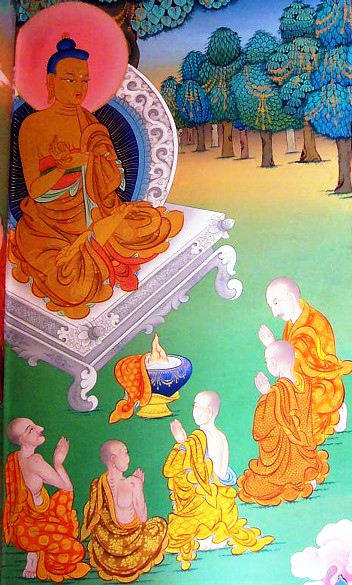Sixteen Aspects of the Four Noble Truths: Difference between revisions
mNo edit summary |
mNo edit summary |
||
| (12 intermediate revisions by 4 users not shown) | |||
| Line 1: | Line 1: | ||
<noinclude>[[Image:Four Noble Truths.JPG|frame|Buddha turning the Wheel of Dharma for the first time]] | <noinclude>[[Image:Four Noble Truths.JPG|frame|Buddha turning the Wheel of Dharma for the first time]] | ||
'''Sixteen Aspects of the [[Four Noble Truths]]''' ([[Wyl.]] ''bdag med rnam pa bcu drug'' or ''bden chung bcu drug'')</noinclude> | '''Sixteen Aspects of the [[Four Noble Truths]]''' (Tib. [[བདེན་པ་བཞིའི་རྣམ་པ་བཅུ་དྲུག་]], [[Wyl.]] ''bden pa bzhi'i rnam pa bcu drug'', or ''bdag med rnam pa bcu drug'' or ''bden chung bcu drug'')</noinclude> | ||
''' | '''Suffering'''<br> | ||
1. Suffering<br> | 1. [[Suffering]] (Skt. ''duḥkha''; Tib. [[སྡུག་བསྔལ་བ་]])<br> | ||
2. Impermanence<br> | 2. [[Impermanence]] (Skt. ''anitya''; Tib. [[མི་རྟག་པ་]])<br> | ||
3. Emptiness<br> | 3. [[Emptiness]] (Skt. ''śūnyatā''; Tib. [[སྟོང་པ་ཉིད་]])<br> | ||
4. Selflessness<br> | 4. [[Selflessness]] (Skt. ''anātmaka''; Tib. [[བདག་མེད་པ་]])<br> | ||
''' | '''Origination'''<br> | ||
5. Cause<br> | 5. Cause (Skt. ''hetu''; Tib. [[རྒྱུ་]])<br> | ||
6. Origination<br> | 6. [[Origination]] (Skt.''samudaya''; Tib. [[ཀུན་འབྱུང་]])<br> | ||
7. Intense Arising<br> | 7. Intense Arising (Skt. ''prabhava''; Tib. [[རབ་སྐྱེ་]])<br> | ||
8. Condition<br> | 8. Condition (Skt. ''pratyaya''; Tib. [[རྐྱེན་]])<br> | ||
''' | '''Cessation'''<br> | ||
9. Peace<br> | 9. Peace (Skt. ''śānta''; Tib. [[ཞི་བ་]])<br> | ||
10. Cessation<br> | 10. [[Cessation]] (Skt. ''nirodha''; Tib. [[འགོག་པ་]])<br> | ||
11. Perfection<br> | 11. Perfection (Skt. ''praṇīta''; Tib. [[གྱ་ནོམ་པ་]])<br> | ||
12. True Deliverance<br> | 12. True Deliverance (Skt. ''niḥsaraṇa''; Tib. [[ངེས་འབྱུང་]], Wyl. ''nges 'byung'')<br> | ||
''' | '''Path'''<br> | ||
13. Path<br> | 13. [[Path]] (Skt. ''mārga''; Tib. [[ལམ་]])<br> | ||
14. Appropriate<br> | 14. Appropriate (Skt. ''nyāya''; Tib. [[རིགས་པ་]])<br> | ||
15. Effective<br> | 15. Effective (Skt. ''pratipatti''; Tib. [[སྒྲུབ་པ་]])<br> | ||
16. Truly Delivering<br><noinclude> | 16. Truly Delivering (Skt. ''nairyāṇika''; Tib. [[ངེས་འབྱིན་]])<br><noinclude> | ||
==The Sixteen Aspects as Remedies for Wrong Views== | |||
In his ''[[General Topics]]'' commentary on the [[Abhisamayalankara]], [[Patrul Rinpoche]] explains:<br> | |||
You may wonder why there are sixteen aspects. The first four are the remedies for engaging in the views of permanence, bliss, mine, and self respectively. The second four are the remedies for the views of there being no cause, a single cause, transformation, and premeditation. The third four are the remedies for the views of thinking that there is no liberation, that suffering is liberation, that the bliss of the dhyānas is | |||
perfection, and that liberation is not absolutely irreversible. The fourth four are the remedies for the views of thinking that there is no path, that this path is bad, that there are other paths, and that this path is also reversible. Therefore, because of these sixteen wrong views, there are sixteen aspects. | |||
==Further Reading== | |||
*[[Jeffrey Hopkins]], ''Meditation on [[Emptiness]]'' pages 292-304 (Wisdom Publications) ISBN 0-86171-110-6 | |||
==External Links== | |||
*{{LH|tibetan-masters/khenpo-pema-vajra/brief-overview-three-turnings|''A Brief Overview of the Three Turnings'' by Khenpo Pema Vajra}} | |||
[[Category:Four Noble Truths]] | [[Category:Four Noble Truths]] | ||
[[Category:The Sixteen Aspects of the Four Noble Truths| ]] | |||
[[Category:Enumerations]] | [[Category:Enumerations]] | ||
[[Category:16-Sixteen]]</noinclude> | [[Category:16-Sixteen]]</noinclude> | ||
Latest revision as of 06:46, 14 September 2023

Sixteen Aspects of the Four Noble Truths (Tib. བདེན་པ་བཞིའི་རྣམ་པ་བཅུ་དྲུག་, Wyl. bden pa bzhi'i rnam pa bcu drug, or bdag med rnam pa bcu drug or bden chung bcu drug)
Suffering
1. Suffering (Skt. duḥkha; Tib. སྡུག་བསྔལ་བ་)
2. Impermanence (Skt. anitya; Tib. མི་རྟག་པ་)
3. Emptiness (Skt. śūnyatā; Tib. སྟོང་པ་ཉིད་)
4. Selflessness (Skt. anātmaka; Tib. བདག་མེད་པ་)
Origination
5. Cause (Skt. hetu; Tib. རྒྱུ་)
6. Origination (Skt.samudaya; Tib. ཀུན་འབྱུང་)
7. Intense Arising (Skt. prabhava; Tib. རབ་སྐྱེ་)
8. Condition (Skt. pratyaya; Tib. རྐྱེན་)
Cessation
9. Peace (Skt. śānta; Tib. ཞི་བ་)
10. Cessation (Skt. nirodha; Tib. འགོག་པ་)
11. Perfection (Skt. praṇīta; Tib. གྱ་ནོམ་པ་)
12. True Deliverance (Skt. niḥsaraṇa; Tib. ངེས་འབྱུང་, Wyl. nges 'byung)
Path
13. Path (Skt. mārga; Tib. ལམ་)
14. Appropriate (Skt. nyāya; Tib. རིགས་པ་)
15. Effective (Skt. pratipatti; Tib. སྒྲུབ་པ་)
16. Truly Delivering (Skt. nairyāṇika; Tib. ངེས་འབྱིན་)
The Sixteen Aspects as Remedies for Wrong Views
In his General Topics commentary on the Abhisamayalankara, Patrul Rinpoche explains:
You may wonder why there are sixteen aspects. The first four are the remedies for engaging in the views of permanence, bliss, mine, and self respectively. The second four are the remedies for the views of there being no cause, a single cause, transformation, and premeditation. The third four are the remedies for the views of thinking that there is no liberation, that suffering is liberation, that the bliss of the dhyānas is
perfection, and that liberation is not absolutely irreversible. The fourth four are the remedies for the views of thinking that there is no path, that this path is bad, that there are other paths, and that this path is also reversible. Therefore, because of these sixteen wrong views, there are sixteen aspects.
Further Reading
- Jeffrey Hopkins, Meditation on Emptiness pages 292-304 (Wisdom Publications) ISBN 0-86171-110-6